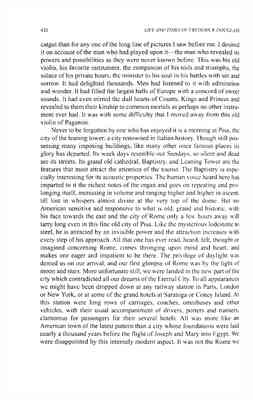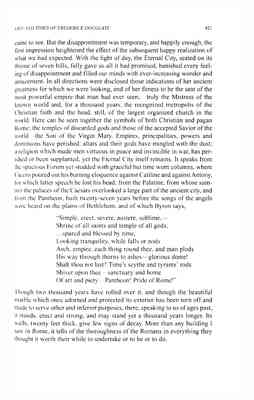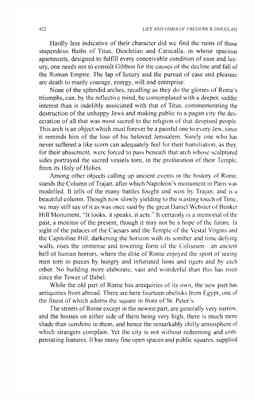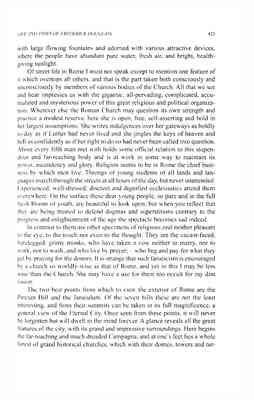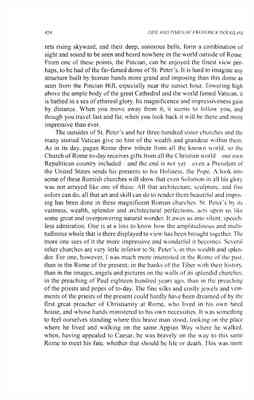Pages
46
420 LIFE AND TIMES OF FREDERICK DOUGLASS
catgut than for any one of the long line of pictures I saw before me. I desired it on account of the man who had played upon it – the man who revealed its powers and possibilities as they were never known before. This was his old violin, his favorite instrument, the companion of his toils and triumphs, the solace of his private hours, the minister to his soul in his battles with sin and sorrow. It had delighted thousands. Men had listened to it with admiration and wonder. It had filled the largest halls of Europe with a concord of sweet sounds. It had even stirred the dull hearts of Counts, Kings and Princes and revealed to them their kinship to common mortals as perhaps no other instrument ever had. It was with some ditliculty that I moved away from this old violin of Paganini.
Never to be forgotten by one who has enjoyed it is a morning at Pisa, the city of the leaning tower: a city renowned in Italian history. Though still possessing many imposing buildings, like many other once famous places its glory has departed. Its week days resemble our Sundays, so silent and dead are its streets. Its grand old cathedral, Baptistry, and Leaning Tower are the features that most attract the attention of the tourist. The Baptistry is especially interesting for its acoustic properties. The human voice heard here has imparted to it the richest notes of the organ and goes on repeating and prolonging itself, increasing in volume and ranging higher and higher in ascent, till lost in whispers almost divine at the very top of the dome. But no American sensitive and responsive to what is old, grand and historic, with his face towards the east and the city of Rome only a few hours away will tarry long even in this fine old city of Pisa. Like the mysterious lodestone to steel, he is attracted by an invisible power and the attraction increases with every step of his approach. All that one has ever read, heard, felt, thought or imagined concerning Rome, comes thronging upon mind and heart, and makes one eager and impatient to be there. The privilege of daylight was denied us on our arrival, and our first glimpse of Rome was by the light of moon and stars. More unfortunate still, we were landed in the new part of the city which contradicted all our dreams of the Eternal City. To all appearances we might have been dropped down at any railway station in Paris, London or New York, or at some of the grand hotels at Saratoga or Coney Island. At this station were long rows of carriages, coaches, omnibuses and other vehicles, with their usual accompaniment of drivers, porters and runners, clamorous for passengers for their several hotels. All was more like an American town of the latest pattern than a city whose foundations were laid nearly a thousand years before the flight of Joseph and Mary into Egypt. We were disappointed by this intensely modern aspect. It was not the Rome we
47
LIFE AND TIMES OF FREDERICK DOUGLASS 421
came to see. But the disappointment was temporary, and happily enough, the first impression heightened the effect of the subsequent happy realization of what we had expected. With the light of day, the Eternal City, seated on its throne of seven hills, fully gave us all it had promised, banished every feeling of disappointment and filled our minds with ever-increasing wonder and amazement. In all directions were disclosed those indications of her ancient greatness for which we were looking, and of her fitness to be the seat of the most powerful empire that man had ever seen;-truly the Mistress of the known world and, for a thousand years, the recognized metropolis of the Christian faith and the head, still, of the largest organized church in the world. Here can be seen together the symbols of both Christian and pagan Rome: the temples of discarded gods and those of the accepted Savior of the world – the Son of the Virgin Mary. Empires, principalities, powers and dominions have perished: altars and their gods have mingled with the dust; a religion which made men virtuous in peace and invincible in war, has perished or been supplanted, yet the Eternal City itself remains. It speaks from the spacious Forum yet studded with graceful but time worn columns, where Cicero poured out his burning eloquence against Catiline and against Antony, for which latter speech he lost his head: from the Palatine, from whose summit the palaces of the Caesars overlooked a large part of the ancient city, and from the Pantheon. built twenty-seven years before the songs of the angels were heard on the plains of Bethlehem. and of which Byron says,
"Simple, erect, severe, austere, sublime, Shrine of all saints and temple of all gods. ... spared and blessed by time. Looking tranquility. while falls or nods Arch, empire, each thing round thee, and man plods His way through thorns to ashes – glorious dome! Shalt thou not last'? Time's scythe and tyrants' rods Shiver upon thee – sanctuary and home Of art and piety – Pantheon! Pride of Rome!"
Though two thousand years have rolled over it, and though the beautiful marble which once adorned and protected its exterior has been torn off and made to serve other and inferior purposes, there, speaking to us of ages past, it stands, erect and strong, and may stand yet a thousand years longer. Its walls, twenty feet thick, give few signs of decay. More than any building I saw in Rome, it tells of the thoroughness of the Romans in everything they thought it worth their while to undertake or to be or to do.
48
422 LIFE AND TIMES OF FREDERICK DOUGLASS
Hardly less indicative of their character did we find the ruins of those stupendous Baths of Titus, Diocletian and Caracalla, in whose spacious apartments, designed to fulfill every conceivable condition of ease and luxury, one needs not to consult Gibbon for the causes of the decline and fall of the Roman Empire. The lap of luxury and the pursuit of ease and pleasure are death to manly courage, energy, will and enterprise.
None of the splendid arches, recalling as they do the glories of Rome's triumphs, can, by the reflective mind, be contemplated with a deeper, sadder interest than is indelibly associated with that of Titus, commemorating the destruction of the unhappy Jews and making public to a pagan city the desecration of all that was most sacred to the religion of that despised people. This arch is an object which must forever be a painful one to every Jew, since it reminds him of the loss of his beloved Jerusalem. Surely one who has never suffered a like scorn can adequately feel for their humiliation, as they, for their abasement, were forced to pass beneath that arch whose sculptured sides portrayed the sacred vessels tom, in the profanation of their Temple, from its Holy of Holies.
Among other objects calling up ancient events in the history of Rome, stands the Column of Trajan, after which Napoleon's monument in Paris was modelled. It tells of the many battles fought and won by Trajan, and is a beautiful column. Though now slowly yielding to the wasting touch of Time, we may still say of it as was once said by the great Daniel Webster of Bunker Hill Monument, "It looks, it speaks, it acts." It certainly is a memorial of the past, a monitor of the present, though it may not be a hope of the future. In sight of the palaces of the Caesars and the Temple of the Vestal Virgins and the Capitoline Hill, darkening the horizon with its somber and time defying walls, rises the immense and towering form of the Coliseum – an ancient hell of human horrors, where the elite of Rome enjoyed the sport of seemg men tom to pieces by hungry and infuriated lions and tigers and by each other. No building more elaborate, vast and wonderful than this has risen since the Tower of Babel.
While the old part of Rome has antiquities of its own, the new part has antiquities from abroad. There are here fourteen obelisks from Egypt, one of the finest of which adorns the square in front of St. Peter's.
The streets of Rome except in the newest part, are generally very narrow. and the houses on either side of them being very high, there is much more shade than sunshine in them, and hence the remarkably chilly atmosphere of which strangers complain. Yet the city is not without redeeming and compensating features. It has many fine open spaces and public squares, supplied
49
THE LIFE AND TIMES OF FREDERICK DOUGLASS 423
with large flowing fountains and adorned with various attractive devices, where the people have abundant pure water, fresh air, and bright, healthgiving sunlight.
Of street life in Rome I must not speak except to mention one feature of it which overtops all others, and that is the part taken both consciously and unconsciously by members of various bodies of the Church. All that we see and hear impresses us with the gigantic, all-pervading, complicated, accumulated and mysterious power of this great religious and political organization. Wherever else the Roman Church may question its own strength and practice a modest reserve, here she is open, free, self-asserting and bold in her largest assumptions. She writes indulgences over her gateways as boldly to-day as if Luther had never lived and she jingles the keys of heaven and hell as confidently as if her right to do so had never been called into question. About every fifth man met with holds some official relation to this stupendous and far-reaching body and is at work in some way to maintain its power, ascendency and glory. Religion seems to be in Rome the chief business by which men live. Throngs of young students of all lands and languages march through the streets at all hours of the day, but never unattended. Experienced, well-dressed, discreet and dignified ecclesiastics attend them everywhere. On the surface these dear young people, so pure and in the full fresh bloom of youth, are beautiful to look upon; but when you reflect that they are being trained to defend dogmas and superstitions contrary to the progress and enlightenment of the age the spectacle becomes sad indeed.
In contrast to them are other specimens of religious zeal neither pleasant to the eye, to the touch nor even to the thought. They are the vacant-faced, barelegged. grimy monks. who have taken a vow neither to marry, nor to work, nor to wash, and to live by prayer;—who beg and pay for what they get by praying for the donors. It is strange that such fanaticism is encouraged hy a church so worldly-wise as that of Rome, and yet in this I may be less wise than the Church. She may have a use for them too occult for my dim vision.
The two best points from which to view the exterior of Rome are the Pincian Hill and the Janiculum. Of the seven hills these are not the least interesting, and from their summits can be taken in its full magnificence, a general view of the Eternal City. Once seen from these points, it will never he forgotten but will dwell in the mind forever. A glance reveals all the great features of the city, with its grand and impressive surroundings. Here begins the far-reaching and much dreaded Campagna, and at one's feet lies a whole forest of grand historical churches, which with their domes, towers and tur-
50
424 LIFE AND TIMES OF FREDERICK DOUGLASS
rets rising skyward, and their deep, sonorous bells, form a combination of sight and sound to be seen and heard nowhere in the world outside of Rome. From one of these points, the Pincian, can be enjoyed the finest view perhaps, to be had of the far-famed dome of St. Peter's. It is hard to imagine any structure built by human hands more grand and imposing than this dome as seen from the Pincian Hill, especially near the sunset hour. Towering high above the ample body of the great Cathedral and the world famed Vatican, it is bathed in a sea of ethereal glory. Its magnificence and impressiveness gain by distance. When you move away from it, it seems to follow you, and though you travel fast and far, when you look back it will be there and more impressive than ever.
The outsides of St. Peter's and her three hundred sister churches and the many storied Vatican give no hint of the wealth and grandeur within them. As in its day, pagan Rome drew tribute from all the known world, so the Church of Rome to-day receives gifts from all the Christian world-- our own Republican country included~and the end is not yet · even a President of the United States sends his presents to his Holiness. the Pope. A look into some of these Romish churches will show that even Solomon in all his glory was not arrayed like one of these. All that architecture. sculpture. and tine colors can do, all that art and skill can do to render them beautiful and imposing has been done in these magnificent Roman churches. St. Peter's by its vastness, wealth, splendor and architectural perfections. acts upon us like some great and overpowering natural wonder. It awes us into silent, speechless admiration. One is at a loss to know how the amplitudinous and multitudinous whole that is there displayed to view has been brought together. The more one sees of it the more impressive and wonderful it becomes. Several other churches are very little inferior to St. Peter's, in this wealth and splendor. For one, however, I was much more interested in the Rome of the past, than in the Rome of the present; in the banks of the Tiber with their history, than in the images, angels and pictures on the walls of its splendid churches; in the preaching of Paul eighteen hundred years ago, than in the preaching of the priests and popes of to-day. The fine silks and costly jewels and vestments of the priests of the present could hardly have been dreamed of by the first great preacher of Christianity at Rome, who lived in his own hired house, and whose hands ministered to his own necessities . It was something to feel ourselves standing where this brave man stood, looking on the place where he lived and walking on the same Appian Way where he walked, when, having appealed to Caesar, he was bravely on the way to this same Rome to meet his fate, whether that should be life or death. This was more
